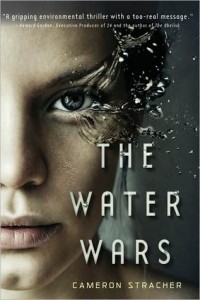 The Water Wars, by Cameron Stracher
The Water Wars, by Cameron Stracher
Rating: 3.5 out of 5
Summary: Vera and her brother Will live in a world where water has become the most valuable asset. Set in a future where the United States has been divided into new countries, where Canada has dammed off the flow of water from everything south of its borders, and where the ocean, mined for its water has become a toxic waste land of salt and pollutants, The Water Wars follows the story of Vera and her brother Will as they go on a wild journey to try to rescue their new friend Kai, who has mysteriously disappeared. As they encounter pirates, militant environmentalists, and corporation thugs, Vera and Will discover the power of friendship and learn that appearances can often be deceiving.
The Good
There were a lot of things I really liked about this book.
Characters
First and foremost, Vera and Will are very likable. They bickered like brother and sister, but you could also feel the love between them. I thought this relationship was very believable and enduring. There were also some great supporting characters, like the Pirate King.
Action
This plot was packed full of action, which I enjoyed. It made me not want to put the book down because I had to know what happened next. Sometimes inner strife can keep me hooked, but usually when a book grabs me and won’t let go, it’s because of the action. While it was a little slow to get going, once Vera and Will set out to find Kai, the action pretty much keeps going and doesn’t stop until the very end.
Concept
I loved that the concept was so believable and I thought the world Stracher created was well-defined. When looking at the politics behind oil, it is easy to imagine another liquid commodity, water, being played in a similar way. While the UN would most likely step in and stop countries like Canada from building a large dam and stealing fresh water sources from the rest of North America, it is not entirely far-fetched that this could at some point happen. Especially if the U.S. becomes a disjointed place made up of several new ‘countries.’
The Cover
I know you aren’t supposed to judge a book by its cover, but the cover is gorgeous and very intriguing.
The not so good
You don’t get a 3.5 star rating if there aren’t elements that I didn’t love, and The Water Wars had a few.
Characters
OK, I know one of the strengths was characters, but this was also one of the weaknesses, particularly with the bad guys. I didn’t really get where they were coming from. I like a villain that is complex. I like to root for him and also despise him. I want to feel like he has some redeeming quality. After all, no one is all evil. Part of this problem could have been a result of the intended age group for the book. This definitely felt more MG than YA and I’ve noticed that often in MG books, villains are evil because they enjoy being evil, pure and simple. But I still would have liked just a bit more depth.
Action
Again, with the good came some not so good. While I loved that the book was packed full of action, sometimes I found that the flow of the action didn’t really make much sense. Like characters suddenly knowing where things would be or events happening in a way that logically did not make much sense. Maybe it was a fault on my part, but this is something I have noticed in a lot of books. It feels almost like some of the scenes are thrown away or like things were edited out but then when editing the next scene, someone forgot that things had been removed from the previous scene. This may or may not have been the case, but that is how parts of the book felt to me when I was reading it.
Environmentalism
I know you are probably scratching your heads. What could be wrong with environmentalism in a book for kids, right? And normally, I would say nothing. I support the earth and I’m all for making people of all ages aware of our precious resources. But when I am reading a book, I like to stumble upon the underlying themes in a more subtle way. I do not like it when they are repeatedly banged over my head. I started to feel like the environmental themes were getting a bit preachy by the end and I felt, instead of helping the message, that it hurt it a bit. The rest of the world may not be like me, but when I feel like I’m being preached to, my first inclination is to do the opposite. I worry that the preachy nature of the “underlying” theme may turn some people off of the message. And if you notice, I put underlying in quotes because it was not so underlying as one might expect.
Concluding Thoughts
All in all, this was a fun read with an interesting plot and, despite the not so good elements, I think it is definitely worth reading. It is totally appropriate for the Middle Grade reader while also being fun for the Young Adult reader.

